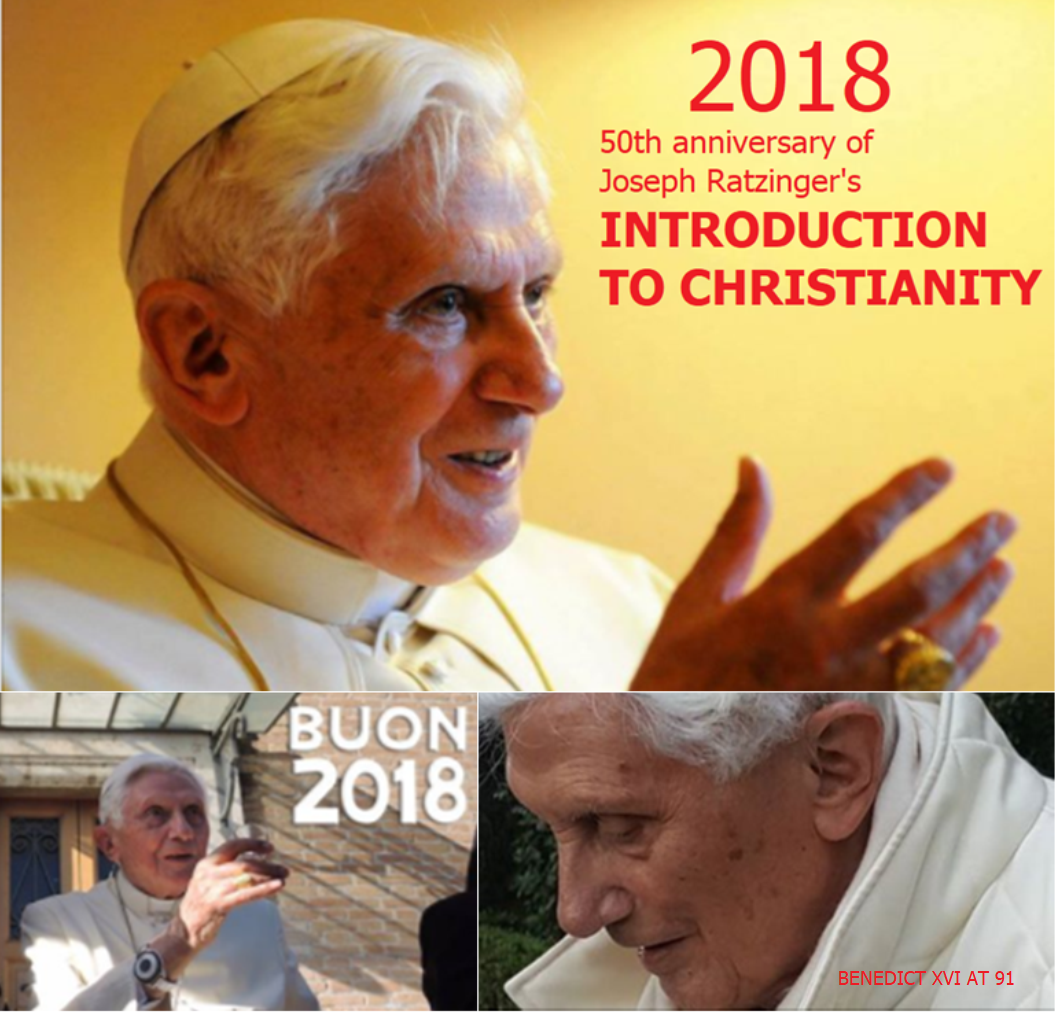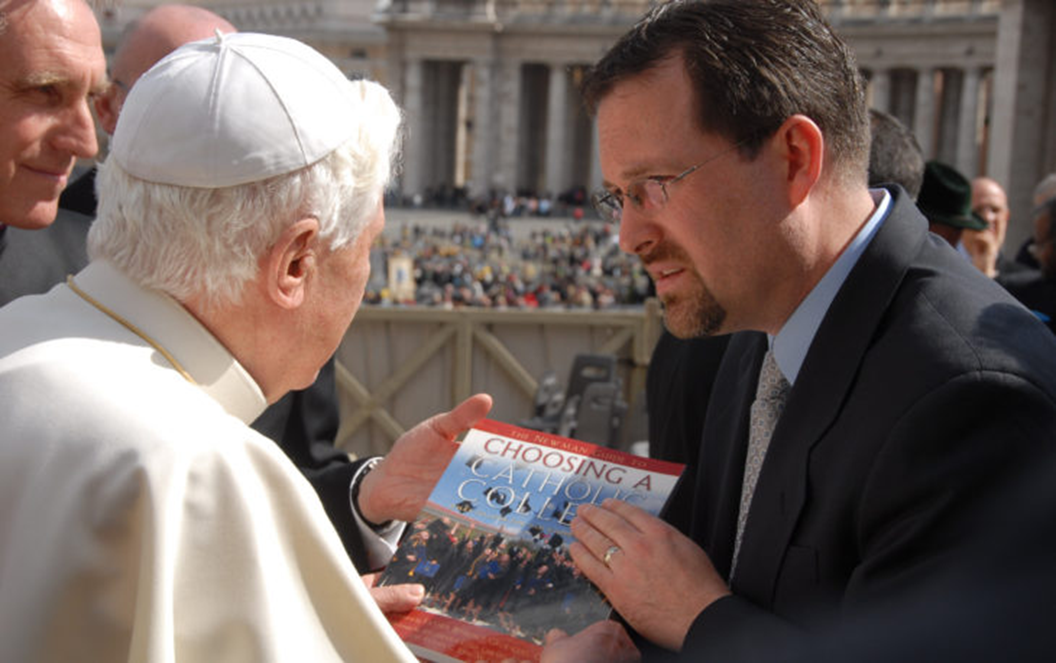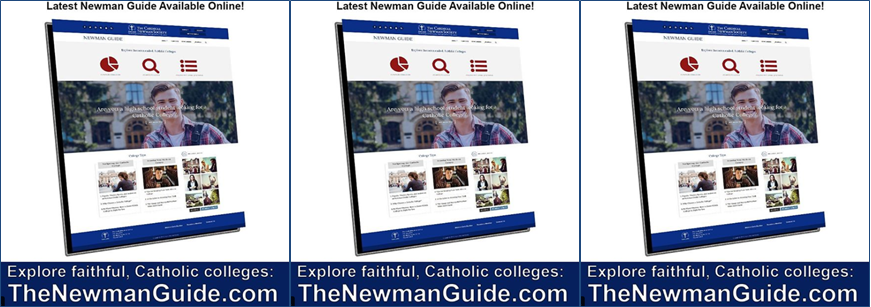 Just a bit of chronological context: 'INTRODUCTION TO CHRISTIANITY', which became an almost-instant theological classic, was published one year before Jorge Bergoglio was ordained a priest.
Just a bit of chronological context: 'INTRODUCTION TO CHRISTIANITY', which became an almost-instant theological classic, was published one year before Jorge Bergoglio was ordained a priest.
ALWAYS AND EVER OUR MOST BELOVED BENEDICTUS XVI

 Pope Benedict receives the first edition of THE NEWMAN GUIDE in 2009 from Patrick Reilly, president of the Cardinal Newman Society.
Ten years since faithful Catholic colleges
Pope Benedict receives the first edition of THE NEWMAN GUIDE in 2009 from Patrick Reilly, president of the Cardinal Newman Society.
Ten years since faithful Catholic colleges
in the USA embraced Pope Benedict’s vision
for a truly Catholic education

April 24, 2018 (LifeSiteNews) – This April marks ten years since then-Pope Benedict XVI challenged American Catholic educators to put Catholic identity and fidelity ahead of other concerns.
And while not everyone embraced his vision, it greatly inspired the 28 colleges and higher education programs recognized by The Cardinal Newman Society for their strong Catholic identity and featured in the 2018-19 edition of The Newman Guide, released today at the completely redesigned and updated website,
www.TheNewmanGuide.com.
Pope Benedict told college and diocesan leaders gathered at The Catholic University of America in Washington, D.C., on April 17, 2008, “First and foremost, every Catholic educational institution is a place to encounter the living God, Who in Jesus Christ reveals His transforming love and truth.”
He urged fidelity to Catholic teaching and a properly defined “academic freedom” that does not deny truth — an appeal that is especially relevant today as the Church prepares for the Vatican Synod on Young People, the Faith, and Vocational Discernment this October. Young Catholics in today’s highly secular culture are in great need of education that presents the truth about God, morality, and Catholic life.
A year after Pope Benedict’s address, Newman Society President Patrick Reilly presented him a copy of the first Newman Guide on the steps of St. Peter’s Basilica — a gift to the Pope who inspired it.
The 28 institutions recommended in The Newman Guide share Pope Benedict’s vision for Catholic education. They take seriously the Holy Father’s claim that Catholic education is “integral to the mission of the Church to proclaim the Good News.” They strive to carry out Pope Benedict’s charge, that “each and every aspect of your learning communities reverberates within the ecclesial life of faith.”
The expanded Newman Guide content available online, free of charge, goes beyond highlighting important differences among faithful colleges. It also helps families understand the value of a faithful Catholic education, how to navigate the college search, and how to guide students in growing their faith on campus.
A printed Newman Guide resource will be available in the fall.
As part of its Newman Guide program, The Cardinal Newman Society has expanded its innovative “Recruit Me” program, which invites The Newman Guide colleges to recruit interested high school students, shares college search tips, and allows seniors to participate in the Newman Society’s $5,000 Essay Scholarship Contest.
For graduates of Newman Guide colleges and others, the Newman Society’s new
www.CatholicEdJobs.com website connects faithful Catholic schools and colleges with qualified job candidates who are dedicated to their Catholic faith and the mission of Catholic education.
Founded in 1993, the mission of The Cardinal Newman Society is to promote and defend faithful Catholic education at all levels, including elementary, secondary, and higher education. The Society is a 501(c)(3) tax-exempt, nonprofit organization supported by individuals, businesses, and foundations.
 Benedict XVI’s charge to Catholic Educators
Benedict XVI’s charge to Catholic Educators
Editorial

April 2018
This month marks the 10th anniversary of Pope Benedict’s historic address to American Catholic educators at The Catholic University of America in Washington, D.C. Today it remains a key to the renewal of faithful Catholic education.
Benedict’s theme was that the destructive “crisis of truth” in the world today — and especially in education — is rooted in “a crisis of faith.”
This was one of the central themes of his too-short papacy, his priesthood and his professional life as a teacher, theologian, and key collaborator of St. John Paul II.
This holy professor-pope saw the West and Christendom rushing down a path of secularization, by which faith is increasingly viewed as contrary to reason and truth. Pope Benedict warned that this was one of the great dangers of our time.
When named the archbishop of Munich in 1977, he adopted the motto “Cooperators of the Truth” and explained it thus:
On the one hand, I saw it as the relation between my previous task as professor and my new mission. In spite of different approaches, what was involved and continued to be so, was following the truth and being at its service. On the other hand, I chose that motto because in today’s world the theme of truth is omitted almost entirely, as something too great for man, and yet everything collapses if truth is missing.
Everything collapses if truth is missing.
Doesn’t that describe the rapid decline of Catholic education, culture and fidelity in recent decades? For Pope Benedict and his saintly predecessor, the renewal of Catholic education was a priority. But the crisis of truth had already corrupted so many Catholic colleges and schools in America.
So even before his 2008 address, Pope Benedict had been sounding the alarm that the Church and the West face what he called an “educational emergency.”
Benedict publicly lamented the loss of hope among many young people — hope that was missing, because so many young people do not know the truth about God and man as His creation.
In his address to American educators, Pope Benedict argued that it is the special privilege and obligation of Catholic education to unite faith and reason, and to teach truth that is revealed by God as well as truth that is observed and reasoned. Even more, faith is not just to be understood, but to be lived.
Therefore, in addition to orthodoxy, the Catholic identity of schools and colleges:
…demands and inspires much more: namely that each and every aspect of your learning communities reverberates within the ecclesial life of faith. Only in faith can truth become incarnate and reason truly human, capable of directing the will alon the path of freedom.
Catholic schools and colleges, therefore, can never limit their focus to the intellect. They also bear responsibility for the spiritual development of their students.
How many Catholic schools or colleges today enthusiastically embrace this responsibility for forming their students for sainthood?
Surely not enough of them. This, then, is at the heart of the problem in Catholic education for which Benedict proposed his solutions.
Pope Benedict charged the Catholic educators:
A particular responsibility therefore for each of you, and your colleagues, is to evoke among the young the desire for the act of faith, encouraging them to commit themselves to the ecclesial life that follows from this belief. It is here that freedom reaches the certainty of truth. In choosing to live by that truth, we embrace the fullness of the life of faith which is given to us in the Church.
Amen! The work today of The Cardinal Newman Society is profoundly shaped by the vision of Pope Benedict. He could have justly scolded the leaders of America’s wayward colleges and secularized Catholic school systems, and we would have welcomed it. But instead he provided a way forward, a gift of immeasurable value. He gave Catholic educators a mandate to end the crisis of truth by embracing and teaching our Catholic faith, from the classroom to the dorm room.
Together in partnership with our members and the growing number of faithful educators at Newman Guide colleges and Honor Roll schools, the Newman Society takes up Pope Benedict’s charge. With the grace of God, our important mission to promote and defend faithful Catholic education will help bring about the renewal that Benedict so greatly desired.
Pope Benedict XVI’s vision for Catholic education
by Dr. Timothy O'Donnell
President, Christendom College
 The following is adapted with permission from a talk given by Dr. Timothy O’Donnell, president of Christendom College, on Feb. 26, 2013. He reflects on Pope Benedict XVI’s address to Catholic educators 10 years ago this month.
The following is adapted with permission from a talk given by Dr. Timothy O’Donnell, president of Christendom College, on Feb. 26, 2013. He reflects on Pope Benedict XVI’s address to Catholic educators 10 years ago this month.
I will never forget Pope Benedict XVI, in his historic address to Catholic educators at The Catholic University of America on April 17, 2008. He gave a calmly reasoned presentation of the fundamental importance of the Catholic faith to the mission of Catholic education at all levels.
The Holy Father began his address by referring to those present as “bearers of wisdom,” immediately signifying the august nature of their calling and mission of service within the Church. Rather than seeing the college and university as something separate and distinct from the Church, he placed this educational mission right at the heart of the mission of the Church:
- “Education is integral to the mission of the Church to evangelize.”
- A Catholic school is first and foremost “a place to encounter the living God, who in Jesus Christ reveals His transforming love.”
Here, the Holy Father immediately pointed out the absolute centrality of faith in Catholic higher education. This encounter with the living God is meant to “elicit a desire to grow in knowledge and understanding of Jesus Christ.” Those who encounter Christ within the Catholic school are drawn by the Gospel to begin to live a new life and to pursue seriously the true, the good, and the beautiful.
Education in truth must guide both the teacher and the student toward objective truth, which transcends the particular and the subjective, and points the student out of his narrow world towards the universal and absolute. For it is only when the student comes into contact with universal and absolute truth that he will be able to proclaim the Christian message of hope. This is especially crucial, the Pope observed, when dealing with today’s secular mindset, which struggles constantly with moral confusion and the fragmentation of knowledge and lacks the unified vision that only the Catholic university can give.
Unfortunately, in the wake of the chaos of the 1960s and ’70s — and the confusion following the Second Vatican Council — the uniqueness of Catholic higher education was compromised by an effort to imitate secular models. In the 1967 Land O’ Lakes Statement, a number of influential US Catholic educators proclaimed that, in the name of academic freedom, no Catholic institution of higher learning could acknowledge any authority outside itself. (In practice, however, the only authority from which the universities could claim independence was the Church herself, not accrediting agencies and the like.)
Tellingly, Pope Benedict clearly pointed out that the Catholic identity of a university is “fundamentally… a question of conviction.” He then asked five radically fundamental questions:
- Do we really believe that only in the mystery of the Word made flesh does the mystery of man become clear? (Gaudium et Spes, 22)
- Are we ready to commit our entire self intellect, will, mind, and heart — to God?
- Do we accept the truth Christ reveals?
- Is the faith tangible in our universities and schools?
- Is it given fervent expression liturgically, sacramentally, through prayer, acts of charity, concern for justice, and respect for God’s creation?
Only when all these questions can be answered in the affirmative is a college or university truly Catholic:
“Only in this way do we really bear witness to the meaning of who we are and what we uphold.”
Those teaching in the Catholic university have a particular responsibility “to evoke among the young the desire for the act of faith, encouraging them to commit themselves to the ecclesial life that follows from belief.” It is precisely in making the act of faith and living that faith within the Church, the Pope stated, that “freedom reaches the certainty of truth.”
Rejecting the relativism which portrays religious faith as a purely subjective matter, the Pope continues,
“In choosing to live by that truth, we embrace the fullness of the life of faith which is given to us by the Church.”
The Holy Father then made what I believe is the central point of his address:
Clearly, then, Catholic identity is not dependent upon statistics. Neither can it be equated simply with orthodoxy of course content. It demands and inspires much more: namely, that each and every aspect of your learning communities reverberates within the ecclesial life of faith. Only in faith can truth become incarnate and reason truly human, capable of directing the will along the path of freedom (Spe Salvi, 23).
In this way our institutions make a vital contribution to the mission of the Church and truly serve society. They become places in which God’s active presence in human affairs is recognized and in which every young person discovers the joy of entering into Christ’s ‘being for others’ (ibid., 28).
Addressing the false understanding of academic freedom, the Holy Father stated:
I wish to reaffirm the great value of academic freedom. In virtue of this freedom you are called to search for the truth wherever careful analysis of evidence leads you. Yet it is also the case that any appeal to the principle of academic freedom in order to justify positions that contradict the faith and teaching of the Church would obstruct or even betray the university’s identity and mission, a mission at the heart of the Church’s munus operandi and not somehow autonomous or independent of it.
I firmly believe that Pope Benedict XVI’s inspiring message and the radical challenge of this address will remain central to any future discussion concerning the purpose and direction of Catholic education in this country.
[Modificato da TERESA BENEDETTA 26/04/2018 10:53]